In the dynamic landscape of Indiana real estate, one team stands out as the pinnacle of excellence: The Indy Home Pros Team at RE/MAX Advanced Realty. Renowned for our unwavering commitment to delivering exceptional results, our recent triumphs in the 2023 rankings reinforce our position as the undisputed leader in the industry. Let's delve into what sets us apart and why aligning with us means embracing unparalleled success.

The collective journey of the hardworking agents at the Indy Home Pros Team to the summit of Indiana's real estate landscape is defined by our unwavering performance and outstanding achievements statewide. In the 2023 RE/MAX Top Producers rankings, we proudly claimed the #1 position in every crucial category: Team | Commercial Only, Top 50 Teams by TRANSACTIONS, and Team | Residential and Commercial Combined. Our expertise extends beyond mere residential properties, as we excel in both Residential and Commercial Combine Combined Categories. Through our relentless pursuit of excellence and innovation, we as a team, continually set new standards, demonstrating our unwavering commitment to exceeding expectations in every transaction.
The Indy Home Pros Team's success transcends local boundaries, earning us recognition on a global scale. In the RE/MAX Year-End Top 100 U.S. rankings, The Indy Home Pros Team secured and impressive position, ranking #16 in both Team, Residential & Commercial categories. Furthermore, on the global stage, we stood strong in the RE/MAX Top 100 Worldwide rankings, achieving a remarkable #37 position in both Team Residential and Commercial categories.

Our excellence in commercial real estate is particularly noteworthy. In the RE/MAX Top 25 U.S. rankings for Large Teams, Commercial we soared to the #3 spot, showcasing our proficiency and expertise in this domain. Moreover, on the global scale, our team's prowess was evident as we clinched the #7 position in the RE/MAX TOP 25 Worldwide rankings for Large Teams, Commercial. In residential real estate, our achievements are equally remarkable. We solidified our presence in the RE/MAX Top 50 Worldwide rankings for Large Teams, Residential, achieving and impressive #36 position. Additionally, in the competitive U.S. market, The Indy Home Pros Team secured a commendable #16 spot in the RE/MAX Top 50 U.S. rankings for Large Teams, Residential. These rankings underscore our team's dedication to excellence and our capacity to achieve outstanding results across various segments of the real estate market.

Are you an ambitious agent ready to take your career to unprecedented heights? Joining the Indy Home Pros Team means gaining access to a supportive culture rooted in mentorship, collaboration, and cutting-edge technology. Led by industry luminary Dennis Nottingham, our team empowers agents to unlock their full potential and thrive in today's competitive market. Seize the opportunity to be part of Indiana's number one team and embark on a journey of unparalleled success. Reach out to us today to explore exciting opportunities and eleveate your real estate career with the Indy Home Pros Team.
Whether you're buying or selling, The Indy Home Pros Team is your trusted ally in achieving your real estate goals. Our proven track record and excellence, highlighted by our recent accolades, ensures that you receive unparalleled service and results that surpass expectations. Don't settle for mediocrity when you can partner with the best. Choose the Indy Home Pros Team for all your real estate needs and experience the transformative power of true expertise.
When it comes to real estate success, trust the team that consistently ranks number one in Indiana and reigns supreme in the industry. Contact The Indy Home Pros Team today to kickstart your journey towards realizing your dreams. With us by your side, your success is not a possibility - it's inevitable. Let's make it happen together.
In Part 1, we’ve shared tips on how to make open houses more inviting, such as using signages, creating shareable videos, putting balloons in mailboxes, and more.
Now, let us dive deeper into the art of attracting buyers during an open house.
If the home you're showing is vacant, virtually staging a few or all rooms will be one of the best open house ideas to inspire buyers to imagine it furnished. If the house has a lot of stuff, colorful purple walls, carpets, or other old-fashioned features, virtual staging might show the owner what it would appear like with a few improvements or a neutral color scheme. Put a photo of the altered area on an easel or display a QR code in a few key rooms to link with a gallery of staged photos online.
One way to not only get attention but keep you in your prospect’s mind is to customize. Attach personalized labels with your contact details and logo to the water or bubbly drink bottles you offer.
Seek out co-branding options with a local restaurant, bakery, or deli. To attract prospective buyers, tiny local shops can display little savory snacks or cupcakes alongside their menus, business cards, or coupons.
Have a coworker, intern, or other person at the open house answer guests' inquiries, ask the proper leading questions, conduct personal guided tours, and watch for particularly interested buyers to follow up with. Get your helper to match up names on the sign-in sheet with interest levels, so you can customize follow-up for promising leads.
The lender can instantly pre-approve prospective purchasers and inform them of the monthly payment amount before they leave the property, allowing the buyer to ascertain their affordability immediately.
Prepare small bags to give with various treats that visitors can take with them. Gift bags are great open-house ideas for promotional products like refrigerator magnets or keychains. Add a packaged cookie from a local bakery and ask nearby shops for samples or coupons.
A raffle is a great way to get visitors to your open house. Think of items like fanny packs, baseball caps, duffel bags, or portable Bluetooth speakers that you can buy in large quantities and mark with your promotional logo. Local businesses may donate a prize if you put their advertising materials in the goodie bags or educational packets. Include a social media and invitation that mentions the raffle.
Listing agents usually welcome other agents' open houses, especially if they're across town. Ask for your open house signs to promote your brand in the community and provide the listing agent an enticing referral fee for every client you secure from the event.
See if two or three local real estate agents want to collaborate on a multiple-house open showing. Plan and advertise the event jointly and create buzz on your social media channels.
Invite local real estate brokers to a private preview. In addition to networking with local industry people, this event can lead to future open house collaboration.
Send them a personalized video follow-up message with their name and an outline of the property's essential features. Messages can be sent after the open house if well-attended, but interested parties should be prioritized.
Reconnect with every individual who was reached. Call them to inquire about their experience, or if they have given you their agent's business card, call the agent to find out what they had to say.

This is one of the most underrated yet effective ways to make an open house more inviting: bake cookies. Instead of buying them, ask the current homeowner if you can use their oven for baking the goods. If you bake late enough, the house will still smell amazing when guests arrive. Just make sure you leave enough time for kitchen cleanup afterward.
A Thank You card can keep the property—and its owner's name and contact information—on a hot prospect's mind. Select a home-themed thank you card or one with a more profound message. You can even provide a photo of the deck view they loved to a Card. Whatever design you choose, write a note and immediately send the card an email or text message.
Executing great open house ideas, such as freshly made cookies and virtual staging, can increase the attraction of your house to potential purchasers. In addition, giving customized follow-ups, partnering with nearby businesses, and offering branded drinks are among the best open house ideas to impress and engage buyers.
As more people choose to work from home, there is a greater demand than ever for a dedicated, fashionable home office. The thing is, it's not just about the aesthetics; it's about the increased productivity with the best home office spaces that showcase your personality.
This post will help you understand the importance of organizing a home office and how to design it.
As office trends shift toward remote work, having adequate floor space for a dedicated office space influences purchasing decisions. Homeowners are no longer pleased with a dark and dreary basement workstation. Instead, remote work requires homeowners to convert a visible location into a dedicated and functional home office space.
This change emphasizes the need to incorporate functional workplace design ideas into your environment. A well-planned office arrangement not only provides comfort during lengthy work hours but also improves the entire appearance of your home.
A rising number of professionals, particularly in crowded locations such as San Francisco, recognize the need to provide specialized space. It's not just about the square footage; it's about designing an area that reflects current workplace design trends while also creating a functional and stylish ambiance.
Working in an isolated but pleasant place improves well-being. To make this statement a reality, here are eight elements you should have in your home office to increase productivity:

Choosing the proper desk chair is an important step in planning any workplace environment. It doesn't matter if it's traditional or contemporary since both designs have their advantages. Aside from the looks, the focus is on comfort and ergonomics.
Investing in an ergonomic chair is essential. It's a critical piece in the home office setup. It's beneficial to the body without the need to sacrifice style.
So, why choose an ergonomic chair?
The purpose of an ergonomic chair is to provide comfort and support your body's posture. It allows you to:
Meanwhile, choosing an adjustable desk allows you to alternate between sitting and standing, which is beneficial for your health.

Any office design relies on lighting. It improves mood, productivity, and eyesight. Instead of fluorescent or overhead lighting, natural light is warmer and friendlier. Working near a window might be relaxing if you have a window overlooking a beautiful skyline or a quiet neighborhood.
Adjustable task lighting can illuminate a work surface without wasting energy or emitting heat. A suitable desk or floor lamp helps you focus the light if you work late or on gloomy days. A lighting professional might recommend desk lamps or overhead lighting for a relaxing atmosphere.

Decluttering boosts productivity and reduces stress. It creates a setting that eliminates distractions and stimulates creativity without compromising personal style, not just white walls or floor space.
There are creative storage solutions that can make your workspace appealing and functional at the same time. You can look at Pinterest for ideas on how to design your area or check our blog posts.
You can also learn how to manage your cable to improve workspace safety and efficiency.

Your workspace is more than functional—it shows your style and imagination. Your routine might be inspired by adding meaningful aspects. Imagine creating an energizing and motivating workplace.

Quality tech equipment and an efficient home office go together. High-speed internet powers modern home offices. Real-time project management, cloud-based collaborations, and online meetings require a strong internet connection.
An excellent internet connection and providers are essential for success. A powerful computer, ergonomic keyboard, and high-resolution monitor boost productivity. One voice command might control your office lights, thermostat, and coffee maker.

It's essential to have a peaceful workspace. Work productivity and concentration are hampered by noise, therefore soundproofing your office from noise is a wise move. Acoustic panels or foam tiles can greatly minimize street and family noise.
Modern office workers, especially those without a dedicated workplace area, love noise-cancelling headphones. These headphones provide an instant quiet zone for work and concentration. Headsets help create quiet time to focus and increase productivity.

A well-designed office includes spaces for short breaks to keep the mind sharp and creativity flowing. Each office needs a comfortable area. The home office should be designed as a place to relax, whether in a bean bag or an ergonomic chair. A coffee station or mini-fridge is a great office addition. Adding plants and soothing decor to your workspace provides a retreat.

Adaptability is crucial in changing times. Your space must adapt whether you change careers, technology, or office design. If your workplace design is good and your work needs to be altered, it can adapt rapidly. Many professionals are considering hybrid work arrangements due to the global shift toward remote employment.
Today's professionals need to know how to design office space at home to be more productive. Proper lighting, organization, and design boost performance.
It also implies using technology, soundproofing, design concepts, and ergonomics to increase performance.
Want more ideas on how to level up your home? If yes, click this link today!
If you like historic homes, these billionaire and celebrity luxury homes will captivate you. These most luxurious celebrity homes in the wealthiest neighborhoods have lavish features, vast layouts, and intelligent designers. This 2024 listing was once owned or rented by celebrities and might be your next home.
Billionaire, celebrity, and sports legend property deals have made history. Several celebrity luxury homes will be available 2024 for individuals seeking luxurious homes with incredible stories.
Here, you'll find the ten most luxurious celebrity homes on the market, each boasting unmatched grandeur and style.

Billy Joel, known for classics like "Uptown Girl" and "Vienna," is trendy among real-estate fans. The musician is selling his big Long Island property for USD 49 million. The 26-acre beachfront estate has five bedrooms and eight baths. One of the most luxurious celebrity homes is Middlesea, near the shore. Currently, purchasers cannot view the real estate listing online.

Carolina Wozniacki and David Lee's South Florida property is one of the most sought-after celebrity luxury homes for sale. The USD 42 million Miami penthouse has five bedrooms, six bathrooms, and a rooftop pool. Oprah and Julia Roberts live near the penthouse. Glass pocket doors, 18-foot ceilings, and a bar and screening room make the duplex sumptuous. The celebrity-owned house's subtle elegance is alluring.
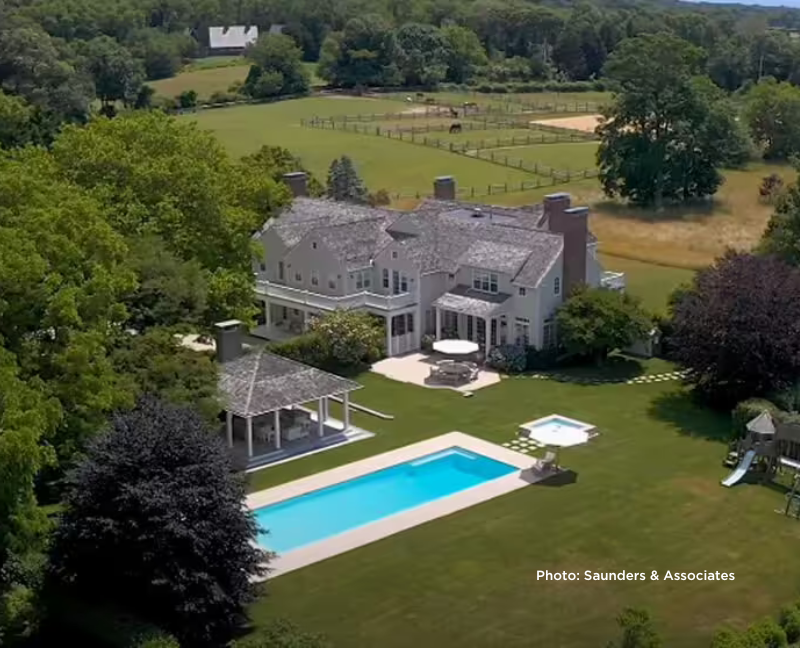
Alec Baldwin put his elegant Hamptons real estate for sale and made a walkthrough video. Last September, the big home was marketed for USD 22.5 million; now, the farmhouse-style estate with modern touches costs USD 18.995. Seven bedrooms and nine bathrooms in 1,276 square feet make up the 1740 beach mansion. This mansion was found in East Hampton's Amagansett area.

Producer Andrew Scheinman of Seinfeld, When Harry Met Sally, and other A-list projects listed his luxurious homes for USD 17.75 million. Los Angeles' 7,200-square-foot home has six bedrooms and nine bathrooms. The second-floor balcony overlooks the Los Angeles skyline and ocean, ideal for sun-kissed shots. Entertainment features like a home theater and an infrared sauna are very extravagant.
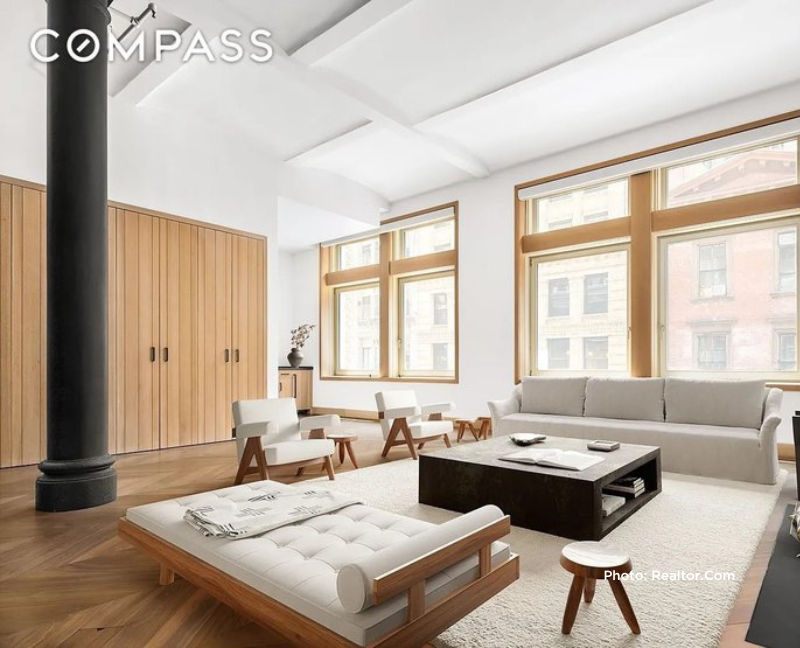
Full House star and The Row co-founder Ashley Olsen is selling her NYC house for $7.25 million. 2 bedrooms, 2.5 bathrooms, and a gourmet kitchen with top-of-the-line appliances are in this big oak-framed, double-paned home. Elegant Olsen's loft has a custom-milled dressing area and white wood cabinets. Classic architecture and superb location make the property an excellent value.

The Oscar-winning actress put her Los Angeles home up for sale recently, unlike some celebrity luxury homes now for sale. This property, which Stone acquired for USD 2.3 million in 2019, is currently listed for USD 3.95 million. The actress meticulously renovated the 100-year-old mansion into a luxury home. Within a week of being listed, the house reportedly found a buyer; however, the realtor's listing indicates that the sale is still pending.

Jeffrey Bezos' Bellevue mansion is ideal. Houses for succeeding in a historical setting cost $2.3 million. One of the most talked-about properties for sale this year is this one. 1954, 1,540-square-foot house, renovated in 2001, has three bedrooms and two bathrooms. This house has natural and illuminating skylights.
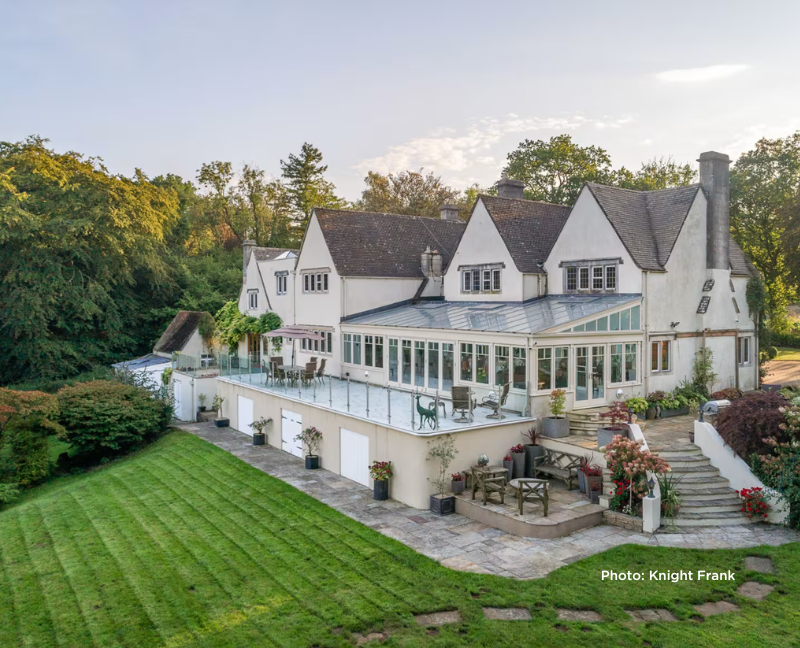
James Bond actor Roger Moore occasionally rented this 1930s Gloucestershire country house. The 4,875-square-foot country home has six bedrooms, five bathrooms, and a vast outbuilding, making it appealing to families. The 2.8-acre property costs GBP 2.1 million. The house has been renovated since 1935 to make it more modern. Despite updated conveniences, the estate retains its country charm.
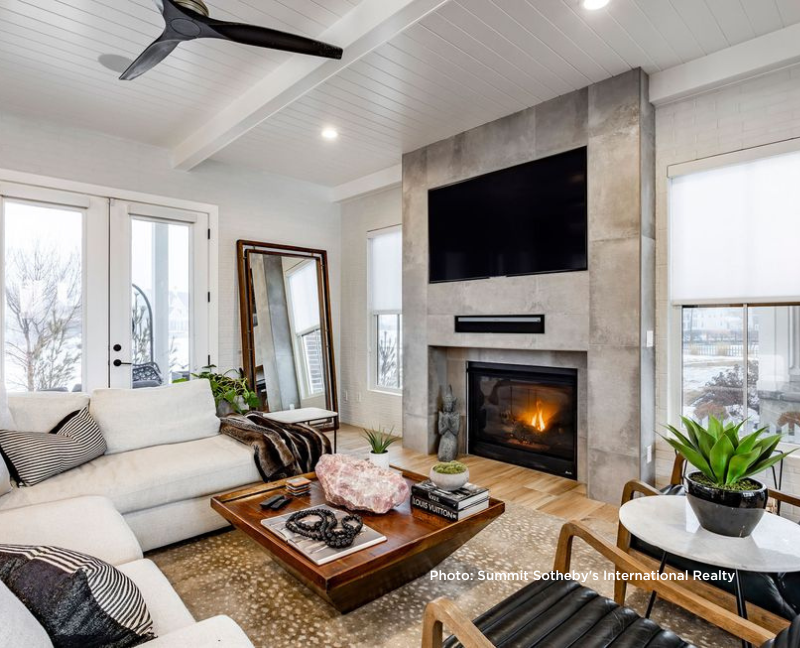
Whitney Rose, from Real Housewives of Salt Lake City, put her 6,100-square-foot Utah home for sale for USD 2.1 million. The show was filmed at the Daybreak Lake property, with various seating spaces, a beautiful patio, and a backyard with a fire pit and mountain views. Offices, a speakeasy bar in the basement, a gym, and a spa are also in the multistory house.
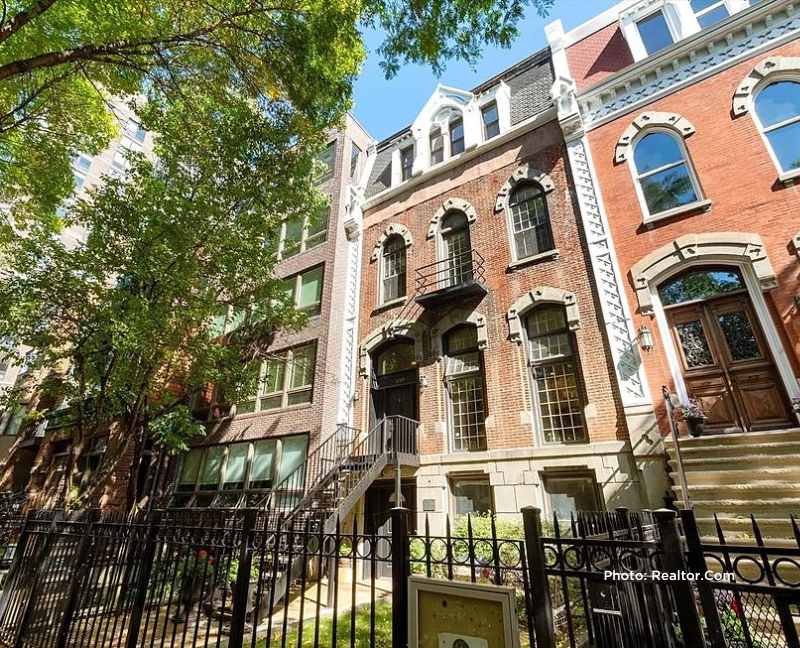
After 55 years, Ernest Hemingway's Gold Coast Chicago apartment is listed for US$2 million. A year after their 1921 honeymoon, Ernest Hemingway and Hadley Richardson filled the flat with memories. Currently, there are two studios and a five-bedroom central house unit—a garage-equipped three-bedroom, one-bath coach home.
Which celebrity homes do you like the most? Feel free to share your thoughts in the comments!
First impressions are crucial when closing the deal on a home. Before even entering a property, potential buyers frequently form opinions. The attractiveness of home staging takes into play at this point in the process.
This post will share the best home staging tips and explain how important staging is when selling a home.
Want to learn more about home staging? Check out these resources:
It is not enough to make a house seem nice; home staging is also an effective marketing strategy that can influence how a prospective buyer perceives the space. When compared to properties that are either vacant or poorly displayed, homes that have been staged typically sell more quickly and at greater prices.
Staging a home can make buyers feel more emotionally connected to the property, resulting in a quicker sale. This is accomplished by highlighting the home's potential and assisting buyers in visualizing themselves living there. Below, you will find the best home staging tips that you can consider to get an excellent first impression of your prospective buyer.
Here are the ten best home staging tips you may consider
To make the space neutral and clean so prospective buyers can picture their belongings, it is imperative to remove personal belongings and extraneous clutter.
The outside is one thing that potential buyers see. Enhance your home's curb appeal by adding new landscaping, keeping the lawn in good condition, and creating a welcoming doorway.
If you want to appeal to a wide variety of interests, keep a neutral color scheme for the walls and the furniture. This makes it easier for buyers to visualize the possibilities for their interior design concepts.
Furniture should be arranged in such a way as to enhance the flow of every space. It is essential to draw attention to the function of each room, whether it is a cozy spot for reading or an organized home office.
Showcase the actual proportions of the spaces by utilizing furniture of a suitable size. A space can feel cramped by things that are too large, while a room can be made to look spacious by items that are too small.
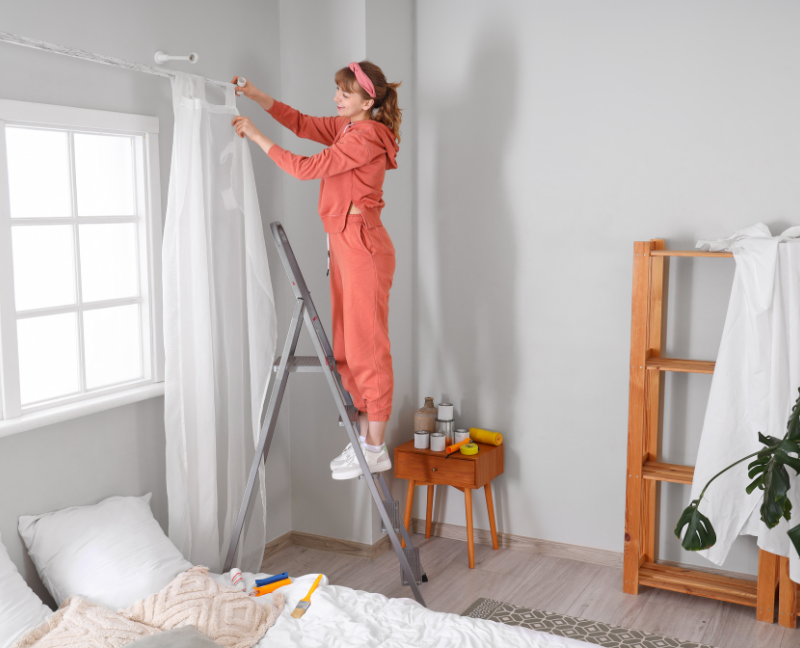
Put natural light into the room by opening the curtains and blinds. Having well-lit areas makes them appear larger and more appealing.
Use accessories such as carpets, artwork, and cushions to provide splashes of color and make the space more visually attractive. You should keep the space manageable, but remember that less is more.
You should highlight important features to attract attention to distinctive designs or selling points, like a comfortable fireplace or a breathtaking vista.
Adding fresh flowers or indoor plants into the design of a space may infuse it with vitality and create an atmosphere that is welcoming and comfortable.
Consider showcasing a room as a model room if the function is only apparent after some time. For instance, you could turn a space unused to its full potential into a home gym or a guest room serving something.
When selling your home, understand that staging is about presenting an appealing narrative that hooks potential buyers' hearts and minds. Above, you can understand how important is staging when selling a home. Adhering to our best home staging tips can help you foster a closer connection between a buyer and a property.
Real estate brokers can reach a large number of prospective buyers by holding an open house, including people who might have yet to see the property. It provides a relaxed setting where interested parties can take a leisurely tour of the house and get a sense of what it might be like to live there.
If you're a real estate agent searching for open house ideas that can improve guests' experiences and distinguish your property from others, then you’ve come to the right place.
Here are some of the best open house ideas for real estate agents that can help their “For Sale” sign into “Sold.”
First, make sure that you advertise your open house on the Multiple Listing Service (MLS) and social media platforms. Update the listing with the open house date and time for the week and tag the location with the necessary details. You might not have followers, but your city has and others might find it in that way.
In line with the statement above, Instagram and TikTok are some of the best platforms to promote an open house. You can also market your listing in local Facebook Groups, your page, and neighborhood websites. Attract more attention by using high-quality photos and videos highlighting the home’s best features.
An excellent open house invitation or flyer can spread the info. Add a Photo Gallery Block with property photos or a Video Block with a customized video tour or message. You may send your flyers and invitations via text, email, or a shareable link on social media. Encourage followers to share them with friends and family.
Inviting neighbors to your open house can increase traffic and sell the home. Real estate has a 10, 10, 20 rule. When you get a listing, knock on ten houses on each side and twenty across the street. In condos, slip a flyer under the front door, which includes an invitation and QR code.
Add a Google Maps link to all your messages, including emails inviting people to your open house or posting images to social media to make it easier for people to locate you.

Going to the area an hour before the open house and posting 30 signs on the busiest roads and crossroads can help. Add arrows on signage that will lead people into the neighborhood and to the residence.
Balloons attract attention, without a doubt. It’s giving a “Hey, something's happening here!" vibe so it makes sense to put balloons in open house signs, mailboxes, porch railings, and other places to easily catch attention.
The day before the open house, clean the sidewalk and the entryway. Bring some greenery to the front door with a few urns, a branded welcome mat, or a giant door wreath.
Use a large framed sign on an easel inside the door saying: "Welcome!" This is a great way to invite them in and make them feel comfortable. Be sure to give a genuine smile, greet them at the table, prepare goodies, encourage them to ask questions, and let them explore the home.
Set up an attractive table for customers to sign in and receive your card, brochure, or other information. Sign in with a digital tablet to appear professional and avoid deciphering messy handwriting. Put fresh flowers on the table and a dish of hard candy for visitors to enjoy.
Make sure you greet guests with a smile and offer to answer any inquiries. When they're done exploring at their own pace, step back and observe.
If your open house is in a cool location or the property has an exciting history, record a video and play it on a tablet or TV. At the end of the video, use a QR code to let guests rewatch or share the movie.
Provide packets with your branding for guests to take and utilize throughout the house. Include basic housing information like square footage, bedrooms, school district, and niche-selling elements like local history or nearby parks, shops, and restaurants.
Use tent cards to highlight a few of the house's best characteristics. QR tags on tent cards can offer visitors on-site security and heated floor information.
To assist buyers in exploring such a large property, strategically place framed floor plans throughout. To help children understand their location and the rest of the house, include a red "you are here" dot.
We hope these tips help in your next open house. We’ve gathered additional expert advice in Part 2 so be sure to click this link to learn more.
Most towns allow residents to eliminate large, bulky, or complex items on designated days of curbside clean-up (also known as bulk trash pickup).
And if you're living where this is implemented, here's how you can get the most out of it.
Find out the day when bulk trash pickup occurs. Some municipalities hold one monthly while others host spring or fall annual or biannual events. Meanwhile, larger cities may plan two or more local curbside clean-up days.
Once you find out when yours takes place, set a reminder on your calendar so you won't miss it.
The "what" is almost as crucial as the "when" regarding bulk trash day information. There are a lot of different regulations about what your community will accept. Some things are widely considered acceptable (carpets, lamps, swing sets), some are typically prohibited (propane tanks, concrete, hazardous chemicals, and many are in between -- which means others may allow them but others won't (small appliances, batteries, yard waste). The resident's responsibility is to do the proper thing with your trash.
Need tips on how to clean your home? Check out these resources:

Prepare for the clean-up day to get the most out of it. Do something about the attic and basement, clean up the garage, and look at what you have. Sort items into bags or piles labeled with Keep, Donate, and Discard. Then, put what's left to the curb, excluding anything that needs a recycling or hazardous trash disposal trip.
To be more specific, the Great Depression. Those who have survived challenging economic times are specialists at making do with what they have and trying to get by. Nowadays, many people like repurposing everyday items that would otherwise go to waste.
Put your trash on Facebook Buy Nothing groups, or Freecycle to find a good home, but be sure to learn about free-stuff etiquette first.
You may also donate to thrift stores and charities. People without transportation or mobility benefit from many organizations' pickup services.
A neighborhood swap meet is a perfect occasion to gather everyone. You can choose a weekend and a venue to "shop" other's pre-loved items and at the same time, get to know the people around you.
Hold a neighborhood yard sale a week or two before curbside clean-up day. Collaboration benefits everyone because multi-household sales get a lot of traffic. If your neighbors are civic-minded, you could collectively sponsor a block party or a pocket park with perennials and a picnic table. Simple seller standards and a little planning will help your transaction succeed.
Follow your town's trash and disposal guidelines to avoid accidentally breaking, leaking, scattering, tempting scavenging animals, or causing other issues.
Take note also of the weight restrictions and item limits. Avoid mixing prohibited trash with allowed ones. Check what time you can put old stuff on your curb. Collectors of copper wiring break apart products like air conditioners, leaving chaos. Discard appliances last minute.
Once you start to get rid of used items down the street, pickers, such as scavengers, salvagers, curb shoppers, scrappers, or gleaners, might come. So if there are items that aren't up for grabs, put them away from the curb to avoid confusion.
On curbside pickup eve, some wealthy would-be HGTVers shop your block. Treat them well—many of them make a livelihood from salvaging. If someone investigates your soon-to-be-ex-property, don't get offended or alert the police. Remember: Once you release something, you lose control over who gets it.
Here are more tips to help you with this:
Salvagers should be respectful as well. If you see an abandoned dresser or bread maker that you want, pull over and turn on your hazards to avoid impeding traffic. Carefully search for items you want without making a mess.
After getting your valuables, put the other stuff aside or neatly back. Don't invade homes or complain about appliances' functionality. Finally, wave and thank neighbors on their porches or outside their windows.
Do you have more tips on how to do curbside cleaning? If yes, feel free to drop them in the comments!
When buying a home, two of the common terms you might hear a lot are "Annual Percentage Rates (or APR for short)" and "Interest rates." Now, while these two might sound like they mean the same, the truth is, there are a few differences that you should know.
So before you get a mortgage, let's learn how:
First thing first, let's learn what these two terms are.
Your interest rate is what you pay a lender when you borrow money for a set amount of time. The mortgage interest rate may be fixed throughout the loan or may vary with market rates. It is always expressed in percentages.
On the other hand, an Annual percentage rate (also known as APR) is the total amount of money you pay for a loan, which includes the interest rate plus any other costs and fees that come with the loan, like private mortgage insurance (PMI), prepaid interest, some closing costs, mortgage points (also known as discount points), and other possible fees.

Your APR is less under your control. Broker and origination fees are other variables that your lender controls and affect your annual percentage rate.
By paying 20% down, you can avoid private mortgage insurance, but comparing lenders is ideal. Loan plans and APR rates should be compared.
Your lender uses personal data to calculate interest. None of them utilizes the same interest formula although some mortgage lenders provide ten interest rates.
Meanwhile, banks consider market interest rates and real estate economy conditions while computing your rate. Your mortgage lender can cut your interest rate in ways. Your rate will generally drop if you reduce your lender's risk.
To get better rates, you have to improve your credit score, a three-digit statistic that shows lenders how you use credit. If you have good credit, it means you pay on time and don't borrow more than you can afford.
Meanwhile, having low credit makes you riskier to lenders as it usually means you have a history of late payments, defaults, etc. As a result, you might get a higher interest rate from a lender or might not get approved at all. VA, FHA, and USDA loans can cut your interest rate.
A federally insured loan will reimburse your lender if your home is foreclosed. The interest rate on a government-backed loan may be lower than on a traditional loan. Remember that mortgage insurance will affect your payment, so consider all your options.
Interest rates are the annual cost of borrowing money whereas APR includes additional expenses. Your APR will be larger than your interest rate because it has interest and other loan expenses.
Your effective interest rate can also be considered your annual percentage rate (APR). Be sure to take into account both the interest rate and the APR while selecting the mortgage loan that is most suitable for your needs.
The Bottom Line
Your APR comprises your interest rate and any other costs or fees you may be required to pay your lender. Your interest rate is the percentage of interest you pay on a loan. Discount points, private mortgage insurance, and brokerage fees are a few of the most popular extra costs. Your annual percentage rate (APR) represents the real interest rate you will pay on your loan after you get it.
Before a loan closes, the lender must disclose to you both the interest rate and the annual percentage rate. By maintaining your credit score and, potentially, selecting a government-backed loan, you can reduce your interest rate. Nevertheless, since the lender determines a lot of these fees, you need more control over your APR. That being stated, comparing comparable loan programs offered by other lenders is the greatest approach to getting a lower APR.
Learn more about mortgages here.
"Less is more" provides a practical alternative in a society where distractions and clutter are widespread. The minimalist lifestyle fosters a deeper and more meaningful journey by removing excess and highlighting essential elements.
Prioritizing personal growth, relationships, and experiences over material possessions and superficial desires characterizes the minimalist lifestyle benefits.
As individuals increasingly strive to simplify and scale down their living environments, this minimalist lifestyle mirrors a broader cultural transition towards simplicity and sustainability.
If you're contemplating adopting a minimalist lifestyle, here are several reasons why you might be inclined to explore its minimalist lifestyle benefits.
Reducing the amount of things and activities you engage in is a necessary part of leading a minimalist lifestyle. This will allow you to live a life that is easier to access and less stressful. When there are fewer things to worry about and work on, you will have more time and attention to dedicate to the important things.
You can save money by becoming minimalist in a variety of ways. You can save money by purchasing fewer items that you don't need. Reducing the size of your living area is another way to reduce your housing expenses. You also require less space to store your belongings when you own fewer of them.
Minimalist living is another way to lessen its impact on the environment. You use fewer resources and make less waste when you make fewer purchases. Reducing your energy use and carbon footprint is another benefit of downsizing.
It is not enough to own fewer things to practice a minimalist lifestyle; one must also prioritize experiences over tangible goods. You can cultivate deeper ties with the people in your life and construct more significant memories if you concentrate on experiences rather than stuff.
Anxiety and stress can be brought on by feelings of being overwhelmed by clutter and mess. Make your environment more serene and calming by minimizing the amount of clutter in your life and streamlining your daily routine. This can be accomplished by reducing feelings of stress and worry and boosting your mental well-being,
If you have fewer things that could distract you, you can concentrate more on the essential things you need. This may help you become more creative and productive, ultimately allowing you to accomplish your objectives efficiently.
In addition, adopting a minimalist lifestyle can assist in developing gratitude. When you have fewer experiences and belongings, you create a greater appreciation for the things that you do have. The cultivation of a sense of gratitude and contentment in your life can be facilitated by doing this.
Conclusion
Simplifying your life, placing a higher value on experiences rather than material belongings, and decreasing your influence on the environment are all ways to make your life more satisfying and meaningful.
Therefore, if you are experiencing feelings of powerlessness due to clutter and distractions, consider having a minimalist lifestyle and observing how minimalist lifestyle benefits might improve the quality of your life.
Making a house as attractive or stylish as possible is not the only goal of house flipping. It's about making the biggest return possible on each property -- just like real estate.
Although the rehabilitation costs of a distressed home may be covered by your fix-and-flip or bridge loan, funding is not the same as free money. One of the most important skills to have while learning how to flip a house is knowing how to use your renovation budget wisely. Performing the greatest house improvements at the lowest possible cost to optimize the home's worth should be the main goal.
Research and prepare before pulling apart a property to restore. Check local housing prices to see what buyers would pay and ROI. Therefore, check local home valuations and sales. After understanding the local real estate market, you must have home improvements. Work with a Realtor who knows your neighborhood to make wise renovation decisions.
Whether you're doing a major or minor project, these seven home improvements will increase your property's value.
Kitchens are vital for real estate investors trying to increase property value. It holds particular areas in people's hearts—a warm, inviting kitchen calls to us on some level.
Fully Renovated: Consider whether the floor plan is modern or efficient before removing all cabinets and fixtures in a complete renovation. Before buying granite or marble counters, try quartz or synthetic stones.
Specific Updates: Kitchen renovation ROI may be low. Consider darker stainless steel for a bolder design. Compare appliances with "provable" efficiency claims. A kitchen with old but serviceable cabinetry can be revived with paint.
Bathrooms show age second only to kitchens, and they always figure on lists of the most valuable home improvements.
Fully Renovated: Installing water-efficient and space-saving sinks and toilets can free up a room. Replace linoleum with sharper flooring to improve. Replacing the shower tile and tub can brighten a dull bathroom.
Specific Updates: Upgrade faucets, knobs, and other sink and bathroom fixtures. Another inexpensive upgrade that may transform a bathroom is cabinetry hardware. Home improvements can be cost-effective without a sophisticated updated floor plan or flashy installations.
Updates like new paint and flooring may seem simple, but they can increase your home value. The most significant effects are sometimes achieved with the simplest upgrades.
Fully Renovated: Some older homes have carpet and aged flooring. Wood is attractive, but you have other options. Bamboo flooring costs less and looks identical. Painting the whole house may renew it.
Specific Updates: Consider installing carpeting instead of hardwood or bamboo flooring in the upper level of your home if you conclude that new flooring is required.
It's essential to make an excellent first impression. The most valuable house upgrades are not limited to the home itself; they extend beyond the home itself.
Fully Renovated: The house's exterior ought to have a spotless appearance. It can be wise to spend money on complete landscaping, which includes lush green lawns and mulched gardens. Remove dead grass with resodding to add greenery.
Specific Updates: The entrance door can look cozy and welcoming with potted plants. Although maintained with few gardens, the backyard should be pleasant and constantly mowed. Design the front yard to draw people to the house. The backyard is just a starting place for the new homeowner to design their ideal yard.

One of the simplest ways to increase the value of your home on a tight budget is to replace the lighting fixtures in your house.
Fully Renovated: An elegant look can be achieved with recessed lighting. It makes a good buzzword for selling the property. Dimmer switches, which are inexpensive and easy to install, provide elegance. Always turn off the room's breaker before touching cords.
Specific Updates: Wattage and color temperature matter when replacing bulbs. A cooler bathroom can look clean with warmer kitchen and living room colors. Your flip may sell for more with minor stylistic changes that complement the home's style and the buyer's market.
The ability to impress buyers with accurate data is a significant benefit of energy-efficient upgrades. It will show them how better your property is than others.
Fully Renovated: Renovations should begin with new insulation. Average houses lose energy from a three-foot-square hole in the wall. Updating windows can also improve energy efficiency.
Specific Updates: Use LEDS in your home or advanced technology to turn your property into a smart home. This helps promote energy efficiency, lifetime, and electricity bill savings to buyers. Start with rebates and free energy audits—there are many government-funded energy efficiency programs to boost house value on a budget.
An expansion will never be a first step when flipping a home. Additions increase livable space but rarely return on investment.
Fully Renovated: Check out surrounding homes that have added extensions before hiring an architect. You can assess the cost-to-return ratio by looking at local sales to evaluate if the extension is worth it. Knowing how an extension will influence your budget from the start is crucial.
Specific Updates: With prefabricated outbuildings, installation is cheaper than ever. Increasing living space to welcome guests, rent on Airbnb, or store products is a significant house improvement, but it's expensive. Consult your realtor to verify a check that covers more than expenses.
Conclusion
Expert house flippers and rental property investors may assess a distressed property and determine what modifications yield the highest profits and how much to flip it for. First-time flippers should engage an experienced general contractor to manage repairs, but get multiple quotations and don't overdo it.

8313 W. 10th St
Indianapolis IN 46234
dennis@indyhomepros.com
317-316-8224